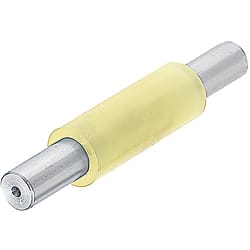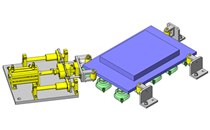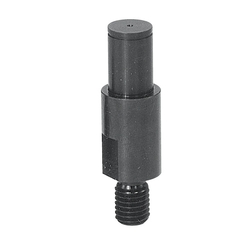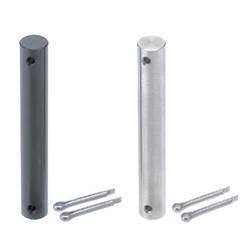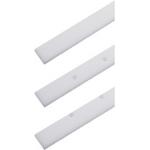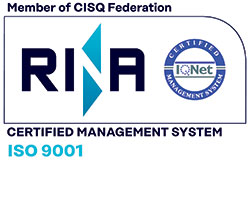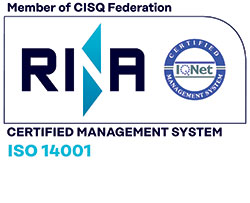Track rollers with PUR tread with corrugations / configurable coating thickness
Part Number
Once your search is narrowed to one product,
the corresponding part number is displayed here.
- Drawing / Specifications
- 3D Preview 3D preview is available after complete configuration
- Part Numbers
- More Information
- Catalog
Back to the Category Idler Rollers
Technical Drawing - Roller with Bearings
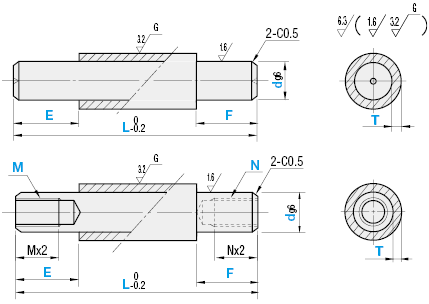
Open the technical drawing in the new window
Available dimensions and tolerances can be found under the tab More Information.
Basic Properties (e.g., material, hardness, coating, tolerance) - Roller with Bearings
■ Straight
| Type | Material | Hardness | |
| Shaft | Lining | ||
| USRH | EN 1.1191 Equiv. | Urethane (Natural Color) | Shore A90 |
| USRM | Shore A70 | ||
| USSRH | EN 1.4301 Equiv. | Urethane (Natural Color) | Shore A90 |
■ Both Ends Tapped
| Type | Material | Hardness | |
| Shaft | Lining | ||
| USRWH | EN 1.1191 Equiv. | Urethane (Natural Color) | Shore A90 |
Further specifications can be found under the tab More Information.
Composition of a Product Code - Roller with Bearings
| Part Number | - | T | - | L | - | E | - | F | - | M | - | N |
| USRH10 USRWH10 | - - | 2 2 | - - | 195 195 | - - | E10 E10 | - - | F10 F10 | - | M5 | - | N6 |
(Both Ends Tapped)
General Information - Roller with Bearings

Selection details of roller bearings
- Core material: aluminum, steel, stainless steel, plastic (POM, UHMWPE, polypropylene, MC nylon)
- Coatings: uncoated, burnished, nickel-plated, anodized
- Material surface: uncoated, polyurethane, antistatic polyurethane, heat-resistant polyurethane (~110°C), polyurethane foam, chloroprene rubber foam, silicone rubber, silicone rubber, nitrile rubber (NBR)
- Hardness: Shore A25, Shore A50, Shore A65, Shore A70, Shore A90, Shore A95
- Surface shape: cylindrical, spherical, groove (split running surface), flange on both sides, knurled
- Roller mounting: through hole, ball bearing, plain bearing bushing, threaded pin clamping, keyway, with axle shaft, lateral through holes
- Bearing material: steel, stainless steel
- Inner diameter: 3 to 40 mm
- Outer diameter: 8 to 100 mm
- Length: 50 to 1000 mm
Description/Basics
The range of applications for roller bearings is diverse in the industry. Basically, the roller bearing is used in mechanical engineering and system engineering for the transport of different objects and workpieces. They are often found in roller conveyors and the conveyance or return of fine films in the packaging industry (packaging).
MISUMI offers different roller bearing surfaces depending on the type of material being conveyed and the application. Whether a gentle rubberized roller bearing for sensitive goods has to be transported, a metal roller, or a massive roller bearing for heavy loads, the MISUMI online shop offers the appropriate roller bearing for almost any application and environmental influences.
A rubberized roller bearing can be equipped with different elastomers to withstand the requirements and influences. These can have different properties such as oil resistance, weather resistance or chemical resistance. MISUMI also offers a rubberized roller bearing with heat-resistant polyurethane (PUR) for higher temperatures.
MISUMI offers an antistatic roller bearing made of polyurethane for transporting electronic components that must be protected against static discharge via the option [UDC].Our roller bearings with foam are a special feature. Compared to conventional foams, the roller bearing with polyurethane foam has a low absorption of water, oil and chemicals. This is made possible by the closed pores of the foam. Another significant advantage of combining a roller bearing with polyurethane foam is the vibration-damping properties of the foam. Roller bearings with foam are also suitable for transporting thinner materials.
A roller bearing with chloroprene rubber foam is particularly low-return and has a high resistance to weather, aging, ozone, heat and cold. This makes it a very balanced foam that is often used in the general industry.
In addition to the materials of the tread, different geometries are also available for various purposes.
Cylindrical roller bearings are often used for roller conveyors or roller carriers.
Balled roller bearings, on the other hand, are often used in conveyor belts in combination with flat belts. The spherical shape of the roller bearing can help align the transport belt in the centre. For flat belts with guide grooves, we offer special flat belt drive wheels that centre the belt more precisely.
Cylindrical roller bearings are often used in roller conveyors or roller carriers. Balled roller bearings are on the other hand often used in conveyor belts in combination with flat belts. The balled shape of the roller bearing can help align the transport belt in the centre. For flat belts with guide grooves, we offer special flat belt drive wheels that centre the belt more precisely.
The roller bearings and metal rollers from MISUMI can be selected in numerous mounting options. In addition, MISUMI offers the roller bearing with clamping groove, plain bearing bushing, integrated axle, lateral mounting holes and keyway.
The roller bearing with keyway groove is particularly suitable in combination with a keyway and rotary axis as a driven roller bearing or conveyer roller. This PDF gives you the keyways tolerances. It is recommended selecting a keyway from MISUMI for the connection, since the tolerances are coordinated.
A roller bearing is often also used in combination with ball bearings. The load capacity depends on the bearing used. The roller bearings with ball bearings are characterized by good smoothness. You can find which bearing was used for the metal roller with ball bearing under the tab More Information.
Rollers with larger outer diameters can also be found under our pipe rollers.
Application Examples - Roller with Bearings
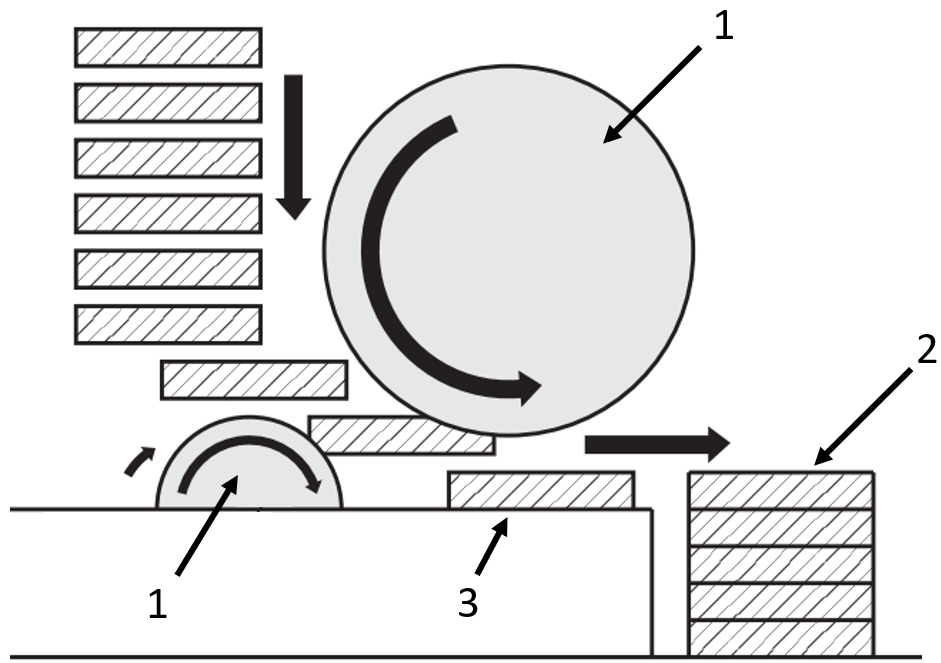
Application example: stack sorter
(1) Roller bearing rubberized, (2) workpiece, (3) plastic plate
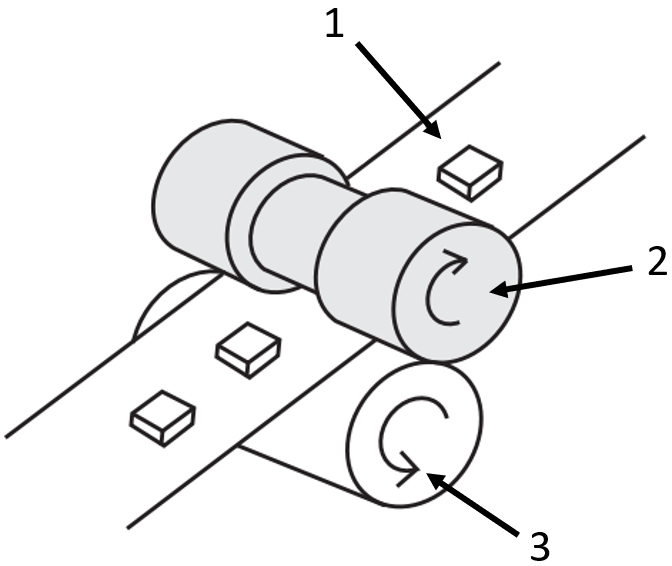
Application example: belt conveyor
(1) Belt, (3) split roller bearing (groove), (3) roller bearing
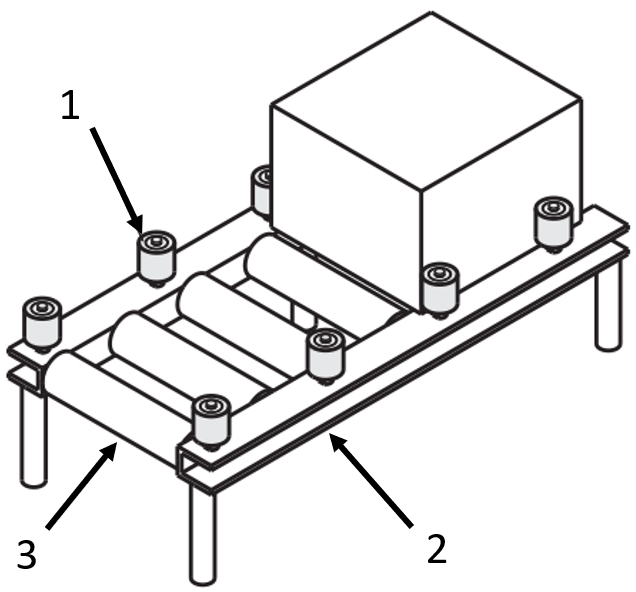
Application example roller conveyor
(1) Vertical guide rollers, (2) roller belt, (3) roller bearing
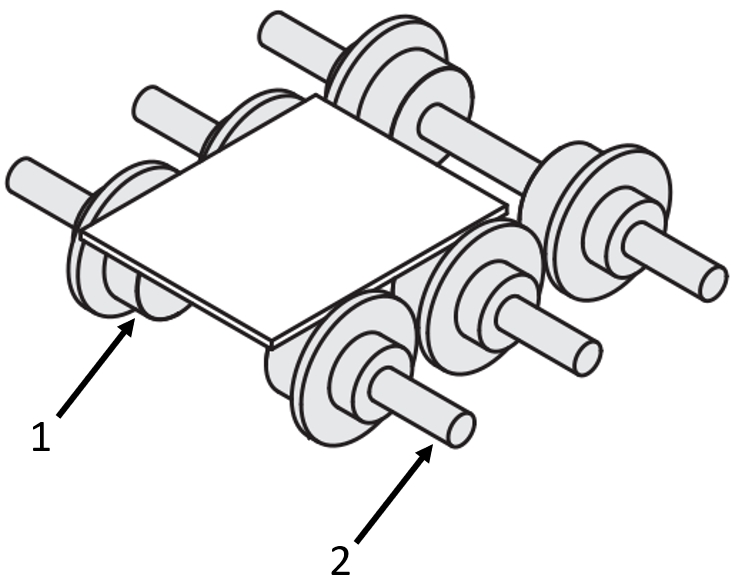
Application example: roller conveyor
(1) Plastic roller bearing, (2) rotary axes
Industrial Applications
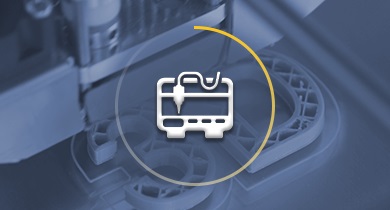
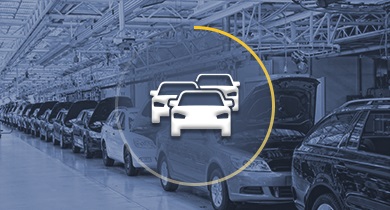

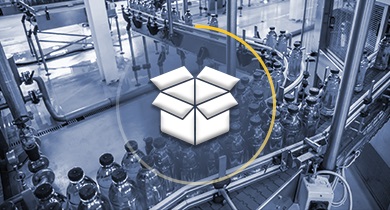
Part Number:
- In order to open the 3D preview, the part number must be fixed.
3D preview is not available, because the part number has not yet been determined.
| Part Number | Minimum order quantity | Volume Discount | RoHS | Material (Base, Core) | I.D. d (mm) | Urethane/Rubber Hardness | Shaft O.D. d (mm) | E (mm) | F (mm) | L (mm) | Screw Dia. Selection [M] | Screw Dia. Selection [N] | T (mm) | |
|---|---|---|---|---|---|---|---|---|---|---|---|---|---|---|
| 1 | 16 Days | 10 | [Steel] EN 1.1191 Equiv. | 8 | 90 | 8 | 5 ~ 100 | 5 ~ 100 | 50 ~ 200 | - | - | 2 ~ 5 | ||
| 1 | 16 Days | 10 | [Steel] EN 1.1191 Equiv. | 10 | 90 | 10 | 5 ~ 100 | 5 ~ 100 | 50 ~ 200 | - | - | 2 ~ 5 | ||
| 1 | 16 Days | 10 | [Steel] EN 1.1191 Equiv. | 12 | 90 | 12 | 5 ~ 100 | 5 ~ 100 | 50 ~ 200 | - | - | 2 ~ 5 | ||
| 1 | 16 Days | 10 | [Steel] EN 1.1191 Equiv. | 15 | 90 | 15 | 5 ~ 150 | 5 ~ 150 | 50 ~ 300 | - | - | 2 ~ 5 | ||
| 1 | 16 Days | 10 | [Steel] EN 1.1191 Equiv. | 8 | 70 | 8 | 5 ~ 100 | 5 ~ 100 | 50 ~ 200 | - | - | 2 ~ 5 | ||
| 1 | 16 Days | 10 | [Steel] EN 1.1191 Equiv. | 10 | 70 | 10 | 5 ~ 100 | 5 ~ 100 | 50 ~ 200 | - | - | 2 ~ 5 | ||
| 1 | 16 Days | 10 | [Steel] EN 1.1191 Equiv. | 12 | 70 | 12 | 5 ~ 100 | 5 ~ 100 | 50 ~ 200 | - | - | 2 ~ 5 | ||
| 1 | 16 Days | 10 | [Steel] EN 1.1191 Equiv. | 15 | 70 | 15 | 5 ~ 150 | 5 ~ 150 | 50 ~ 300 | - | - | 2 ~ 5 | ||
| 1 | 16 Days | 10 | [Steel] EN 1.1191 Equiv. | 8 | 90 | 8 | 5 ~ 100 | 5 ~ 100 | 50 ~ 200 | 3 ~ 5 | 3 ~ 5 | 2 ~ 5 | ||
| 1 | 16 Days | 10 | [Steel] EN 1.1191 Equiv. | 10 | 90 | 10 | 5 ~ 100 | 5 ~ 100 | 50 ~ 200 | 4 ~ 6 | 4 ~ 6 | 2 ~ 5 | ||
| 1 | 16 Days | 10 | [Steel] EN 1.1191 Equiv. | 12 | 90 | 12 | 5 ~ 100 | 5 ~ 100 | 50 ~ 200 | 5 ~ 8 | 5 ~ 8 | 2 ~ 5 | ||
| 1 | 16 Days | 10 | [Steel] EN 1.1191 Equiv. | 15 | 90 | 15 | 5 ~ 150 | 5 ~ 150 | 50 ~ 300 | 5 ~ 10 | 5 ~ 10 | 2 ~ 5 | ||
| 1 | 16 Days | 10 | EN 1.4301 Equiv. | 8 | 90 | 8 | 5 ~ 100 | 5 ~ 100 | 50 ~ 200 | - | - | 2 ~ 5 | ||
| 1 | 16 Days | 10 | EN 1.4301 Equiv. | 10 | 90 | 10 | 5 ~ 100 | 5 ~ 100 | 50 ~ 200 | - | - | 2 ~ 5 | ||
| 1 | 16 Days | 10 | EN 1.4301 Equiv. | 12 | 90 | 12 | 5 ~ 100 | 5 ~ 100 | 50 ~ 200 | - | - | 2 ~ 5 | ||
| 1 | 16 Days | 10 | EN 1.4301 Equiv. | 15 | 90 | 15 | 5 ~ 150 | 5 ~ 150 | 50 ~ 300 | - | - | 2 ~ 5 |
Loading...
Back to the Category Idler Rollers
Technical Drawing - Roller with Bearings

Open the technical drawing in the new window
Specification Tables - Roller with Bearings
| Part Number | T 1mm Increment | L 1mm Increment | E, F 1mm Increment | Both Ends Tapped Only | |||||||
| Type | d | M (Coarse), N (Coarse) | |||||||||
| Straight USRH USRM USSRH | Both Ends Tapped USRWH | 8 | 2~5 | 50~200 | 5≤E<L/2 5≤F<L/2 | 3 | 4 | 5 | |||
| 10 | 4 | 5 | 6 | ||||||||
| 12 | 5 | 6 | 8 | ||||||||
| 15 | 50~300 | 5 | 6 | 8 | 10 | ||||||
Basic information
| Roller Type | Urethane, Rubber Roller | Urethane Rubber Processing | Lining | Mounting Method | Groove |
|---|---|---|---|---|---|
| Roller Shape | Straight | [L] Length (Range)(mm) | Up to 50 / Up to 100 / Up to 300 | Surface Treatment | Not Provided |
| Urethane/Rubber Material | Urethane | Urethane/Rubber Color | Natural Color |
Configure
Basic Attributes
-
Material (Base, Core)
- Steel
- EN 1.4301 Equiv.
- Steel
-
I.D. d(mm)
-
Urethane/Rubber Hardness
- 70
- 90
-
Shaft O.D. d(mm)
- 8
- 10
- 12
- 15
-
E(mm)
-
F(mm)
-
L(mm)
-
Screw Dia. Selection [M]
-
Screw Dia. Selection [N]
-
T(mm)
-
Type
- USRH
- USRM
- USRWH
- USSRH
-
Filter by CAD data type
- 2D
- 3D
Optional Attributes
- The specifications and dimensions of some parts may not be fully covered. For exact details, refer to manufacturer catalogs .
Frequently Asked Questions (FAQ)
-
Question:
How is the foam attached to the support roller?
-
Answer:
The foam is pressed onto the roller bearing (core material). In order to prevent the foam from slipping or severely deforming, it should be ensured that the load is uniformly distributed.
-
Question:
Can the polyurethane layer be replaced?
-
Answer:
The polyurethane layer is generally vulcanized onto the roller bearing. If the polyurethane layer is heavily worn, it is therefore recommended replacing the roller bearing as one unit. Please see the basic properties, in order to find out if the polyurethane layer is vulcanized.
-
Question:
Are the polyurethane rollers oil resistant?
-
Answer:
The polyurethane roller bearings are only partially resistant to oil. These can be swelled and damaged by oil. For this purpose, MISUMI offers roller bearings with a nitrile rubber layer that is oil-resistant. Nitrile rubber (NBR) is often used for sealing rings due to this property. You can view further information in the rubber properties available as a PDF.
-
Question:
Are the roller bearings with PU coating suitable as a drive pulley?
-
Answer:
MISUMI offers roller bearings with tightening screws or with a keyway that can be used as a roller pulley. Especially the roller bearing with a keyway in combination with a parallel key (machine key) ensures a good transmission of rotational movements.
Complementary Products
MISUMI Unit еxample related to this product
Tech Support
- Technical Support
- Tel:+49 69 668173-0 / FAX:+49 69 668173-360
- Technical Inquiry
